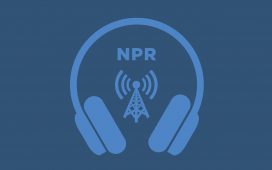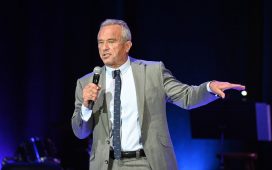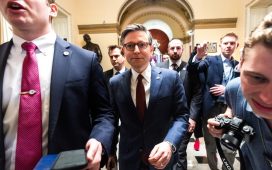ATLANTA — The masks, when used, can muffle the dueling chants of a live-action partisan clash. But the messages of this election season still have a way of carrying.
“No more years!” anti-Trump locals shouted at his supporters this past week in Atlanta, where a Joe Biden appearance had lured both camps to a patch of grass between a gas station and a creek.
“Four more years!” the incumbent’s backers called out even louder, largely unencumbered by face coverings.
“Black Lives Matter!”
“Black Lives MAGA!”
“Lock him up!”
“Lock HIM up!”
Ah, consensus.
In the course of human events that should probably be taking place virtually this year, in a house so divided that talk of jailing opponents registers as typical fare, in a country asking not what can be done, exactly, but whether anything can at this point, an election is happening on Tuesday.
It is not a hope-and-change kind of year. It is not a moment for being made great again.
Instead, a tour of these final, furious campaign days makes clear that the abiding theme of 2020 is something like survival: getting to 2021 in one piece, individually and collectively.
“At this point, civil war is one bad joke away from happening,” said Jorge Puertas, 21, ducking the rain outside an early-voting site in Hialeah, Fla. “One misunderstanding.”
By the dismal standards of the times, the election’s very arrival can feel like a feat: Here is a date transpiring as scheduled, unmoved by a president who floated delays that he lacked the authority to impose. Here is a national appointment kept.
It is merely everything else that seems different, especially to the comparative few absorbing it all at close range.
On one side, campaign rallies have often been reduced to car-bound honk-fests, for epidemiology’s sake. On the other, they are undimmed — and discouraged by public health authorities.
Taken together, these last campaign snapshots can double as a sort of rolling testament to national contradiction, rendered often in dizzying succession: the swagger and the nihilism, the faith and the faithlessness (“Jesus 2020: Our Only Hope” is a popular sign choice), the blithe invocation of outright fracture.
“Guillotine 2020,” read another sign displayed on a West Philadelphia porch recently, among the wind chimes and planters. “No More Presidents.”
Mr. Puertas, who said he worked for a local Democratic group and cast his ballot for President Trump anyway to avoid disappointing his grandfather, described his inaugural presidential voting experience like this: “It’s almost like picking your first alcohol. You know it’s not good for you, you know you’re going to feel bad in the morning. But you’ve still got to make that choice at one point or another.”
Keep up with Election 2020
Most conversations across the ideological expanse tended toward such fatalism almost immediately.
There is the virus to outlive, the opponent to outlast, the threats that must be outrun, many say — eroding liberties, police violence, institutional rot — if the whole enterprise is to endure in recognizable form.
At stake, in their accumulated telling:
“Freedom,” said Anays Garcia, 55, wearing an oversize cutout of Mr. Trump’s face over her own at the Hialeah polling place.
“Our liberation,” said Jasmine Keith, 33, an organizer with Movement 4 Black Lives Atlanta, petitioning in a “Defund Police” mask up the road from a John Lewis mural.
“Kind of feels like everything,” said Elizabeth Miller, 29, cradling a French bulldog named Adelaide outside the National Constitution Center in Philadelphia.
She had come one October evening to take stock of a scene that, like so many others lately, would make little sense to a political time traveler from even the recent past.
The block was the site of a solo television forum with Mr. Biden, scheduled because the second presidential debate was canceled after Mr. Trump’s coronavirus diagnosis and subsequent refusal to appear remotely. But others had gathered, too: climate activists who suspect the Democrat will disappoint them if elected; a presidential spoofer in a red tie, wobbling into traffic with a golf club (“I’m supposed to be mimicking,” the man said, reading the stage directions a bit); a bus-driving visitor with a deafening speaker system and strong feelings about when life begins.
“ABORTION IS MURDER,” he said on a loop, blocking a lane.
“So is ignorance!” Ty Jenkins, 57, hollered back, ticking off coronavirus statistics.
A third man in a Sixers basketball jersey stepped in front of the bus, tried to order the driver out in a hail of expletives, then began an E-A-G-L-E-S chant that no one joined.
Mr. Jenkins went to his parked car and blasted smooth jazz in a futile bid to drown out the driver. He shrugged.
“This,” he said, “is where we go off the rails.”
There is plenty of that this year.
And yet the homestretch has also accommodated flashes of whimsy and community endemic to any campaign. In Reading, Pa., faces swung skyward at the sight of an eagle overhead just before Vice President Mike Pence was to arrive — a sure signal, attendees reasoned, of divine approval for their cause. In Miami Springs, Fla., where Barack Obama visited last week, an eager volunteer cried out “you were my first!” and the former president thanked her, before gently suggesting a rephrasing.
There is also still the merry patter of children tagging along — to the polls, to the rally, to anywhere someone will take them these days: the boy thwacking his forehead with a lawn sign while waiting for the president’s middle son to move the masses at a Lansing, Mich., gravel pit; the girl giggling in her Snow White Halloween costume on a sidewalk in Rome, Ga., fussing under her grandmother’s arm on a recent afternoon as the adults spoke warmly of QAnon conspiracists.
Any Covid-age novelties have generally sorted into one of two categories. There are the bleak-but-necessary turns, like insta-thermometers beside the candidate literature at field offices and the introduction of early-voting venues that moonlight as virus testing locations. And then there are the flourishes that rate as more disorienting than distressing.
Especially popular among Democrats is the distanced car rally, where honks of approval gild stump speeches with the dulcet tones of the Holland Tunnel the Wednesday before Thanksgiving.
“When the auto industry was in trouble, Joe Biden was there …” Honnnnnnnnnnk.
“The United Steelworkers …” Honnnnnnnnnnk.
“I kind of like it better,” said Alannah Garrett, 19, hanging out the window of an orange Mustang at a Jill Biden drive-in event in Saginaw, Mich. “Nobody’s stepping on my shoes.”
Mr. Trump has been less impressed. “You heard a couple of horns. ‘Honk, honk,’” he shared in Lumberton, N.C. last week, after watching Mr. Biden on television. “It’s the weirdest thing.”
But then, Trump campaign affairs have long proceeded at their own speed, virus or not. If anything, the peak-volume cheering and conspicuous fan attire has only accelerated in this urgent political hour, with admiring messages etched on shirts, masks, painted rocks.
His supporters fear a new social order in any Democrat-led future.
“As a middle-aged white male, I’m the target,” T.J. Whipple, 52, said in Reading.
“Normal People for Trump-Pence,” read a poster inside the Cobb County Republican headquarters in Marietta, Ga.
And the loyalties, and occasionally Trump-affiliated histories, run deep.
“He came to thank me for using his hotel,” remembered Julio Martinez, 77, a onetime boxing promoter for shows in Atlantic City decades back and a former mayor of Hialeah, where he stood in a “Vets for Trump” shirt beside a life-size executive cutout. “I told him, ‘One day, you are going to be in politics.’ And he told me the F-word.”
So enthralled are the president’s most devoted charges that praise can flow even for pedestrian acts. In Lansing, the state Republican chairwoman, Laura Cox, appeared to salute Mr. Trump for having worn a hat in inclement weather at a recent rally.
“He was like, ‘I didn’t know it was going to be such gale force winds,’” she said, warming up the crowd for Eric Trump at a sand-and-gravel business. “It was very, very authentic.”
The younger Mr. Trump worked through a catalog of boasts and grievances (“We deal with a lot of rigged processes, guys — we’ll get to Nobel Peace in a second”) and assured those listening that his father’s team had “God on our side.”
“We’re going to get these guys,” he told a well-wisher on the almost entirely unmasked, cheek-to-cheek-selfie rope line afterward. “I promise you.”
In interviews, there was a bipartisan instinct toward such vengeance-seeking — or, at least, the hope that a decisive result on Tuesday (or whenever the counting is done) would amount to a well-earned comeuppance for the losers.
But few seemed convinced that even their desired outcome would deliver catharsis.
“Truthfully, I’m scared if he wins or if he loses,” Derrick Ward, 51, of Philadelphia, said of Mr. Trump, picking up lawn signs at a Biden office. “It’s a boiling point.”
At the Atlanta event, Keyla Ramirez, 18, stood atop a car with a “Black Lives Matter” poster, dancing to a Fugees song someone was playing and recounting how “stupid” she felt casting her first-ever vote, more against Mr. Trump than for his rival.
“We’re not going to get what we want right now,” she said. “But we need that orange pill out.”
This seemed to be the upshot for those moved to participate, however grudgingly, in this particular democratic experiment: This was not the year to stay away.
And maybe, some hoped, the act would prove habit-forming.
Outside Florida’s South Dade Regional Library — where those casting ballots last weekend were greeted with a steel drum band covering Bob Marley and several pop-up cafecito stations — Dennis Valdes, 36, had constructed a tent intended to attract even the leeriest voter with balloons, snacks and “patriotic punch,” spiked for those of age.
A teacher of high school history, Mr. Valdes said he had strained for years to make students understand that any present national despair was not destiny.
“How would John Lewis teach this moment?” he asked. “How would any of our heroes teach this moment?
Eventually, Mr. Valdes spotted two former students, approaching for fist-bumps. “I’m happy for you guys,” he said quickly, playing it cool.
When they were gone, Mr. Valdes lowered his mask enough for a smile to slip.
“First-time voters,” he said. It was a start.
He exhaled, a little, then reached for the punch again.





